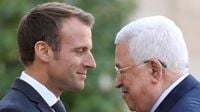On August 23, 2025, the Dutch parliament delivered a decisive verdict: it would not recognize a Palestinian state nor impose sanctions on Israel, even as international pressure and domestic political upheaval reached a fever pitch. The decision, reported by Politico and other outlets, comes at a pivotal moment in European and Middle Eastern diplomacy, with France leading a renewed push for Palestinian recognition and the humanitarian crisis in Gaza intensifying by the day.
The Dutch vote unfolded against a backdrop of mounting internal strife. Just a day earlier, Dutch Foreign Minister Caspar Veldkamp shocked the political establishment by resigning from his post. His reason? The government’s refusal to introduce tougher sanctions on Israel in response to the worsening humanitarian situation in Gaza. In a dramatic ripple effect, lawmakers from the centrist New Social Contract (NSC) party—Veldkamp’s political allies—also vacated their seats, deepening the sense of crisis in The Hague.
Yet, rather than endorsing recognition or punitive measures, most Dutch lawmakers rallied behind a different motion. They urged Israel to allow both international and domestic journalists free access to the Gaza Strip, and called for intensified pressure on countries supporting Hamas leaders. This nuanced approach, while sidestepping the more contentious question of statehood, underscored the complex calculus facing European governments as they navigate the ever-shifting landscape of the Israeli-Palestinian conflict.
Meanwhile, the winds of change were blowing forcefully from Paris. In July, French President Emmanuel Macron made headlines by announcing his intention to formally recognize a Palestinian state during the September session of the United Nations General Assembly. According to Politico and other sources, Macron’s move was not a bolt from the blue. It followed weeks of mounting domestic and international pressure, as images of famine and devastation from Gaza flooded the global media and galvanized public opinion across Europe.
Macron has been unambiguous about his motivations. “The urgency is to end the war in Gaza and provide aid to the civilian population,” he declared in recent remarks, as reported by Politico. “There must be an immediate cease-fire, including the release of all hostages and massive humanitarian assistance to the people of Gaza.” For Macron, establishing and guaranteeing a Palestinian state is “vital for contributing to security in the Middle East.” He has repeatedly argued that a two-state solution is essential not only for regional stability, but also for Israel’s long-term security.
The French president’s initiative is part of a broader European diplomatic push that began in earnest on July 23, when Macron met with German Chancellor Friedrich Merz to discuss the Gaza crisis. At that meeting, Macron acknowledged the “enormous domestic pressure” he was facing, hinting that a formal recognition of Palestine was on the horizon. Just two days later, he confirmed the plan and sent a letter to Palestinian Authority President Mahmoud Abbas, signaling France’s readiness to take a historic step.
France’s campaign has not been without controversy. Israeli Prime Minister Benjamin Netanyahu responded to the French and British moves with fierce criticism, particularly after UK Prime Minister Keir Starmer warned Israel that Britain could follow France’s lead if Israel did not allow aid into Gaza and agree to a cease-fire. Netanyahu dismissed the British warning as “rewarding terrorism”—a sentiment that reflects the deep divisions among Western allies over how best to address the crisis.
Despite Israel’s objections, France has pressed ahead, rallying support from its European neighbors and beyond. On July 30, France and Saudi Arabia co-hosted a conference that produced the so-called “New York Declaration.” Seventeen nations signed the pledge, expressing their readiness to recognize a Palestinian state at the September UN Assembly. The declaration went beyond mere symbolism: it called for a two-state solution, urged Hamas to disarm, demanded the transfer of power to the Palestinian Authority, and condemned the October 7 massacre that reignited the current conflict.
As of August 24, 2025, 139 of the 193 United Nations member states have recognized Palestinian sovereignty—a figure that underscores the growing international consensus, even as key Western powers like the United States and the Netherlands remain cautious. France’s coalition, launched just weeks earlier, has already drawn the backing of 15 countries, with more expected to join as the September Assembly approaches.
Back in the Netherlands, the fallout from the parliament’s decision continues to reverberate. The rejection of Palestinian recognition and sanctions on Israel has exposed deep rifts within the Dutch political establishment. The resignation of Foreign Minister Veldkamp and his NSC allies has thrown the government into turmoil, highlighting the difficulty European leaders face as they try to balance moral imperatives, strategic interests, and domestic political realities.
For many Dutch lawmakers, the priority remains ensuring transparency and accountability in Gaza. By urging Israel to grant journalists access and intensifying pressure on Hamas’s international backers, the Dutch parliament sought to carve out a middle path—one that acknowledges the suffering of Gaza’s civilian population without taking sides in the heated debate over statehood and sanctions.
Still, the Dutch stance stands in sharp contrast to the more assertive posture adopted by France and its allies. Macron’s willingness to defy Israeli objections and press ahead with recognition has raised hopes among Palestinians and their supporters, while drawing criticism from those who fear it could embolden Hamas or undermine prospects for a negotiated settlement. The “New York Declaration,” with its call for Hamas’s disarmament and a transfer of authority to the Palestinian Authority, represents an attempt to square this circle—offering recognition as an incentive for moderation and reform within the Palestinian movement.
As the September UN General Assembly session draws near, the stakes could hardly be higher. The humanitarian crisis in Gaza shows no sign of abating, and the political fallout in European capitals continues to mount. France’s bold initiative has injected new urgency into the debate, forcing governments across the continent to clarify their positions and confront the ethical and strategic dilemmas at the heart of the Israeli-Palestinian conflict.
In the end, the Dutch parliament’s decision to reject Palestinian recognition and sanctions on Israel may reflect the enduring caution that has long characterized European policy on the Middle East. But with France and a growing coalition of nations poised to take a dramatic step on the world stage, the status quo may soon be a thing of the past.
How this diplomatic drama will play out in New York, and what it will mean for the people of Gaza and the broader region, remains to be seen. For now, one thing is clear: the question of Palestinian statehood is back at the center of international politics, and the world is watching closely.


